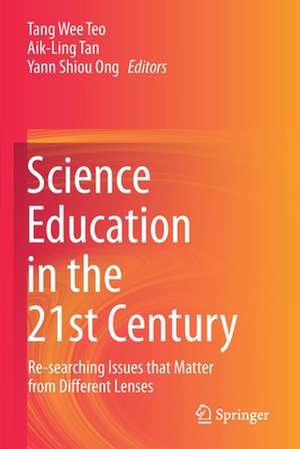Science Education in the 21st Century: Re-searching Issues that Matter from Different Lenses
Editat de Tang Wee Teo, Aik-Ling Tan, Yann Shiou Ongen Limba Engleză Paperback – 30 iun 2021
| Toate formatele și edițiile | Preț | Express |
|---|---|---|
| Paperback (1) | 642.18 lei 43-57 zile | |
| Springer Nature Singapore – 30 iun 2021 | 642.18 lei 43-57 zile | |
| Hardback (1) | 648.42 lei 43-57 zile | |
| Springer Nature Singapore – 30 iun 2020 | 648.42 lei 43-57 zile |
Preț: 642.18 lei
Preț vechi: 755.51 lei
-15% Nou
Puncte Express: 963
Preț estimativ în valută:
122.92€ • 133.56$ • 103.32£
122.92€ • 133.56$ • 103.32£
Carte tipărită la comandă
Livrare economică 21 aprilie-05 mai
Preluare comenzi: 021 569.72.76
Specificații
ISBN-13: 9789811551574
ISBN-10: 981155157X
Ilustrații: XVIII, 309 p. 40 illus., 20 illus. in color.
Dimensiuni: 155 x 235 mm
Greutate: 0.47 kg
Ediția:1st ed. 2020
Editura: Springer Nature Singapore
Colecția Springer
Locul publicării:Singapore, Singapore
ISBN-10: 981155157X
Ilustrații: XVIII, 309 p. 40 illus., 20 illus. in color.
Dimensiuni: 155 x 235 mm
Greutate: 0.47 kg
Ediția:1st ed. 2020
Editura: Springer Nature Singapore
Colecția Springer
Locul publicării:Singapore, Singapore
Cuprins
1 Introduction.- Section A: Re-searching Science Curriculum and Teaching.- 2 Conceptualizing multiplicities of scientific literacy from five theoretical perspectives.- 3 Representations of nature of science in new Korean science textbooks: The case of 'scientific inquiry and experimentation'.- 4 Pedagogical and content expertise in team-based learning: Re-aligning two teaching perspectives in an undergraduate medical school.- 5 A classics reading approach to nurture epistemic insight in a multidisciplinary and higher education context.- 6 Opportunistic science teaching and learning "outside" the classroom.- Section B: Re-searching Science Learners and Learning.- 7 Scientific argumentation as an epistemic practice: Secondary students' critique of science research posters.- 8 Effects of concept mapping technique on Nigerian junior secondary school students' cognitive development and achievement in basic science and technology (integrated science).- 9 Embedding multiple modes of representations in open-ended tests on learning transition elements.- 10 Trustworthiness challenge in children's environmental problem solving in the digital era.- 11 Assessing conceptual understanding in primary science through students' multimodal representations in science notebooks.- 12 An analysis of power play in the subculture of lower track science classrooms.- 13 Facilitating the use of research in practice: Teaching students to plan experiments.- 14 Working memory capacity and teaching and learning of stoichiometry.- Section C: Re-searching Science Teachers and Teacher Education.- 15 Pre-service science teachers' reflections on the field experience: Does context matter?.- 16 Teachers' view on replacing traditional chemistry experiments with green chemistry (GC) experiments.- 17 Preliminary results on the value of investing in training for practicing Chilean life science teachers.- 18 Teaching integration of 5E instructional model and flower components.- 19 Crafting literature-based task: Our journey on viva voca and thought processes.- 20 Learning trajectory of a science undergraduate working as an intern in a research laboratory: A science practice lens.- 21 The role of empowerment evaluation in the professional development of science teachers in the enactment of an inquiry-based pedagogy.
Notă biografică
Tang Wee Teo is an Associate Professor in the Natural Sciences and Science Education Academic Group, National Institute of Education (NIE), Nanyang Technological University, Singapore. She is an equity scholar in STEM (science, technology, engineering, and mathematics) education. Her research interests include STEM education, critical studies, cultural studies, and gender studies. Currently, she is the Co-head of the Multi-centric Education, Research and Industry STEM Centre at NIE.
Aik-Ling Tan is an Associate Professor at the Natural Sciences and Science Education Academic Group at the National Institute of Education (NIE), Nanyang Technological University, Singapore. She is also the Deputy Head for Teaching and Curriculum Matters. Her current research interests include teacher-student interaction in science classrooms, professional development needs of science teachers and STEM education. Aik Ling enjoys working with science teachers in schools to better understand the practical issues and tensions of teaching and learning science.
Yann Shiou Ong is a Postdoctoral Fellow at the National Institute of Education, Nanyang Technological University, Singapore. Her current research focuses on secondary students’ epistemic practices in scientific inquiry, specifically how students engage in group critique and construction practices. She adopts the productive disciplinary engagement framework and its guiding principles to analyse classroom/group discourses and the corresponding instructional designs. While she takes a pragmatic approach to data analysis, her research questions have mostly lent themselves to qualitative methods such as discourse analysis. Her other research interests include scientific models and modelling, social metacognition, and learning progressions.
Textul de pe ultima copertă
This book reflects on science education in the first 20 years of the 21st century in order to promote academic dialogue on science education from various standpoints, and highlights emergent new issues, such as education in science education research. It also defines new research agendas that should be “moved forward” and inform new trajectories through the rest of the century. Featuring 21 thematically grouped chapters, it includes award-winning papers and other significant papers that address the theme of the 2018 International Science Education Conference.
Caracteristici
Revisits longstanding, significant issues in science education research through alternative lenses to rejuvenate the field Presents emergent new issues in science education research to push new frontiers Defines new research agendas that should be “moved forward” and inform new trajectories through the rest of the 21st century
